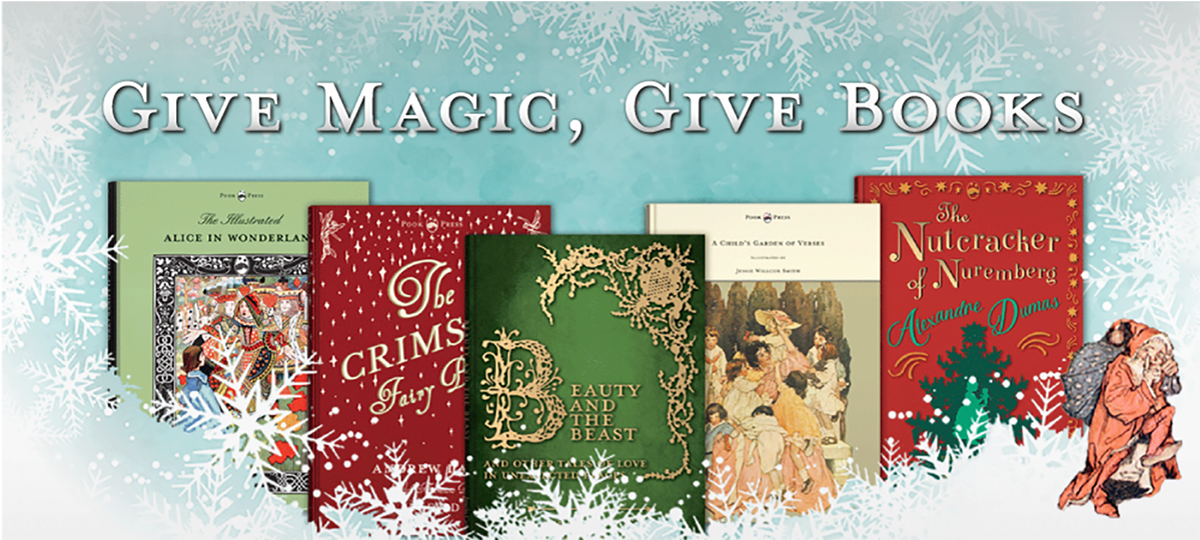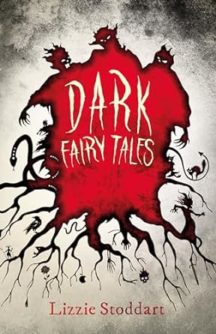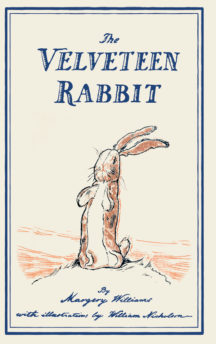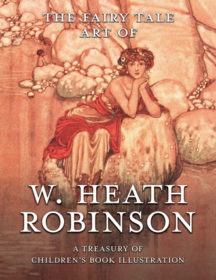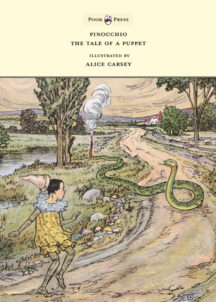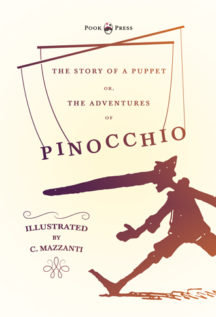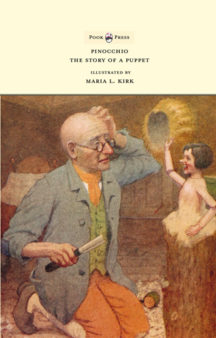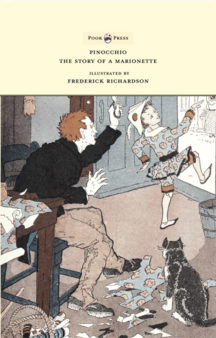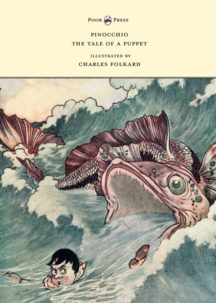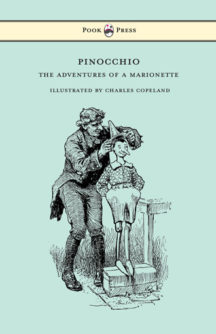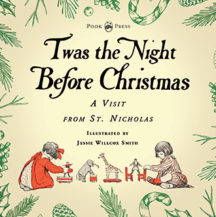Tiny Tim – The Story of A Christmas Carol
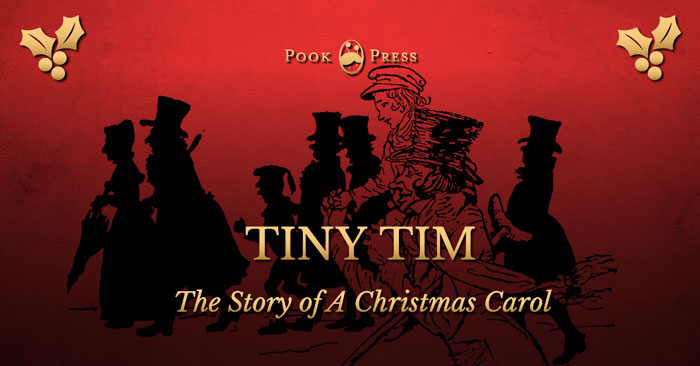
An old miser with a heart of stone, the spirits of Christmas past, present and future, and a small miracle on Christmas day.
Tiny Tim
– The Story of A Christmas Carol –
Retold by Jessie Willcox Smith
A CHRISTMAS CAROL, by Charles Dickens, is one of the most famous of all the Christmas tales in the English language, and in many households it is read aloud by the fireside at every succeeding season, and people hear it through a mist of smiles and tears. It has the very breath and spirit of Christmas in it, and, as you read, the walls dress themselves with holly, mistletoe hangs in the doorway, church bells ring and sleigh bells tinkle out-of-doors, and on the frosty air come floating delicious odors of plum pudding, red-hot chestnuts, spicy mince pies, cherry-cheeked apples, luscious grapes, and slowly browning turkey.
The book has a very picture-gallery of people in it, and Timothy Cratchit, youngest child of Robert Cratchit, Esquire, is but one tiny figure among the many. He is like a miniature painted on ivory which does not hang upon the wall, but lies with others of its kind upon a velvet cushion in a glass case; and yet his is the face we love the best in the book, and the one that comes most clearly to us when the Christmas carols sound.
You can see him in the picture, standing by his father at the Christmas service—fair-haired, blue-eyed, with just a hint of rose in his cheeks, and his sweet lips a bit apart as he joins with the boy choir in:
Hark, the herald angels sing,
Glory to the new-born King!
His little crutch stands beside him in the pew, for he is also a little lame prince, like another boy in this picture book of yours, but far happier than that royal lad because he has a good and loving father and mother and a bevy of brothers and sisters.
If there is any hero in the book, I suppose it is Scrooge, Ebenezer Scrooge, the employer of Tim’s father, though it is hard to make a hero out of a man whose very name sounds like a creaking door, or a dull saw trying to cut through a tough plank. We have it on Dickens’s own written word that Scrooge was a “squeezing, wrenching, grasping, scraping, clutching, covetous old sinner,” and that he was “hard and sharp as flint, secret and self-contained, and solitary as an oyster!”
Pretty material for a hero, isn’t it? But by and by, when you read the book, you will see how the Three Spirits—the Ghosts of Christmas Past, of Present, and of Future—so worked upon the hard old heart, far down in the depths of hard old Scrooge, that it began to beat again, to send rich blood coursing through his veins, and to stimulate him to kind words and deeds.
Ebenezer Scrooge was Bob Cratchit’s employer, as before said, and Bob was the father of tiny, crippled Tim, of Martha, of Belinda, of Peter, and also of two middle-sized Cratchits, like the middle-sized Bear—neither so big as the biggest, nor so small as the smallest. That was a large family to keep, even had Mr. Cratchit’s been an equally large salary; but, as it was, it is no wonder that poor Bob never could afford an overcoat, but wore instead a white comforter around his neck, closely wrapped, with the ends hanging down below his waist.
The book begins on Christmas Eve, in Mr. Scrooge’s office, and he is crosser than the crossest Turk in Constantinople, wishing there were no such day as Christmas, fiercely refusing his nephew’s invitation to dinner, grudging poor Bob his holiday at home, and declining to give one penny to some gentlemen who come to ask him for a subscription for the poor.
“If there are so many of the poor as you say,” said Scrooge, sharply, “they’d better die and decrease the surplus population. I have enough to do to mind my own business. Good evening, gentlemen!”
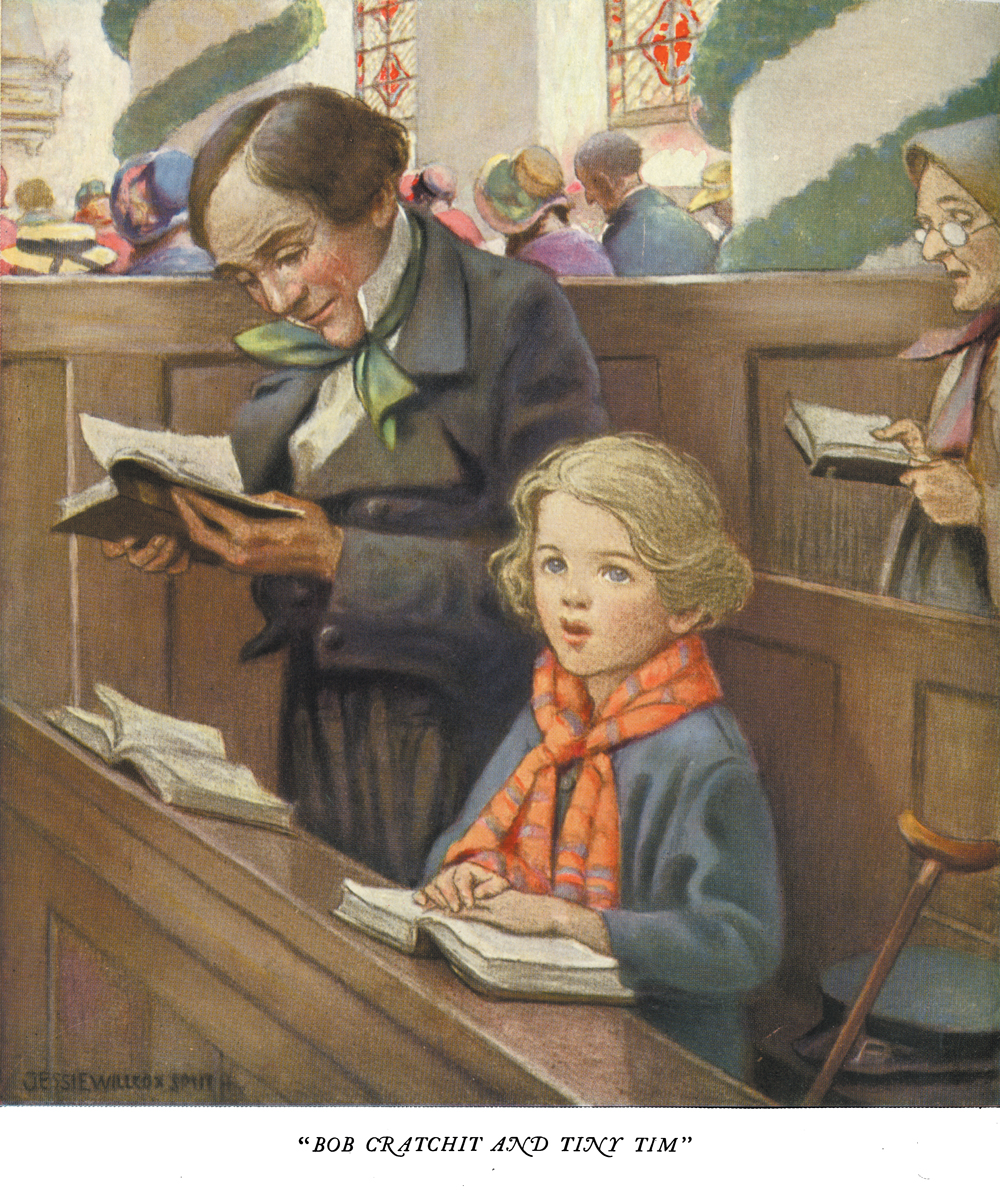
Satisfied with having made everybody about him “as unhappy as the stones in the road,” as they say in France, old Scrooge went home to his lonely house and his lonely room; and by and by, while he was still minding his own business, the Ghost of Christmas Past came to his bedside and constrained him to walk abroad with him.
Of course Scrooge was afraid; not because the Spirit wore a frightful form, for indeed his face was fair, and he bore a sprig of greenest holly in his hand. No, it was not that; but because the unearthly visitant proclaimed that he was the Ghost of Christmas Past, and would bear Scrooge through the window and abroad upon the air to visit again the scenes of his boyhood.
Only the day before he had growled in his office: “Out upon Merry Christmas! A fig for the Season! What’s Christmas time to me?” and now he was to see what it had been to him in youth, and so refresh his withered heart with the dews of memory.
Scrooge and the Spirit soared above the little town where he was born, and saw the merry boys on their shaggy ponies, laughing and shouting, and calling Christmas greetings to one another as they parted at the cross-roads for their several homes. They saw the old boarding-school where Scrooge had been left once for the holidays, and the lonely boy sitting there without companions, save those in the books he was reading. They saw the long-dead little sister running to throw her arms about his neck and to tell him they were to spend Christmas together, and by and by when Scrooge had grown older, they saw the warehouse where he had been employed in London, and the wonderful Christmas party given by Mr. and Mrs. Fezziwig to everybody employed in the house and in the business.
It is of no use for me to try to tell you about that party—nobody but Charles Dickens could have described it or could have told how they sang and talked and danced and feasted and were gaily and innocently happy. Scrooge felt it all—oh, yes, he remembered it—and when the Spirit looked on him intently, he saw a tear upon Scrooge’s furrowed cheek.
When the first aërial journey was over, Scrooge sank to sleep again in his own bed, and never wakened till the bell in the neighboring church struck One! when, not much to his surprise, for nothing could surprise him now, he found that he lay in a blaze of ruddy light that streamed from the adjoining room. Creeping softly to the door and peeping in, he saw a jolly Giant, robed in green, a holly wreath upon his curls, bearing in his hand a glowing torch shaped like Plenty’s horn.
“I am the Ghost of Christmas Present,” cried the figure. “Hold fast to my robe and we will fare abroad and see how the world keeps holiday at this most blessed time of all the year.”
I will honor Christmas in my heart, and try to keep it all the year”
Scrooge had learned many things of the Ghost of Christmas Past, and now he was submissive and ready to follow the new Spirit whithersoever he might go.
In a moment they stood in the winter streets, and saw the people shoveling away the snow and calling Merry Christmas to their neighbors; they saw the grocers’ and fruiterers’ windows, overflowing with dainties; they heard the bells ringing, and saw the families trooping to church, and then they soared on high, far over the land and saw that in shepherds’ huts upon the moors, deep down in mines, in lonely lighthouses, on ships at sea, even in prisons and among the convicts there was no man who had not a kinder word for another on that day and who had not remembered those he cared for with a warmer heart.
They went to many poor and humble houses, too, but to none among them all happier than Bob Cratchit’s—Scrooge’s ill-paid clerk. Bob and Tiny Tim had gone to church, but everybody else was at home save Martha, the eldest girl, and everybody was either preparing dinner, expecting dinner, talking about dinner, or smelling dinner; and everybody was dressed for the occasion, including Peter, who proudly wore his father’s collar.
Then in came Martha, who was a dressmaker’s helper and had been detained by press of work; and then Bob himself with Tiny Tim upon his shoulder. Of course great rejoicing followed over the united family, and presently Tim was borne off by the two middle-sized Cratchits that he might hear the Christmas pudding singing as it boiled.
“And how did little Tim behave at church?” asked Mrs. Cratchit.
“As good as gold,” said Bob, “and better. Somehow he gets thoughtful, sitting by himself so much, and thinks the strangest things you ever heard. He told me, coming home, that he hoped the people saw him in the church, because he was a cripple, and it might be pleasant for them to remember, upon Christmas Day, who made lame beggars walk and blind men see.”
The father, and the mother, too, were a little tremulous and tearful as Tim’s words were repeated, for indeed the little lad was far from strong, but in a moment the tap of his crutch was heard, and it was announced that dinner was ready!
There was a roast goose for dinner, but there was as much excitement about it as if it had been a hippogriff or a unicorn, and, indeed, one was about as rare as the other in that household. There were mashed potatoes, too, and apple sauce; and there was certainly plenty of these, even if the goose was not so very big. And then there was a pudding—a perfectly wonderful pudding—and everybody admired it and exclaimed about it and feasted on it, and nobody said or thought that it was at all a small pudding for such a large family. “Any Cratchit would have blushed to hint at such a thing!”
You can fancy how old Scrooge felt while he and the Spirit looked upon these things, and how he marveled at the happiness the Day had brought to these humble people. He noted Tiny Tim especially, sitting by his father’s side when the dinner was over, and when good little Bob cried: “A Merry Christmas to us all, my dears; God bless us,” he heard, with tears, how Tim echoed, “God bless us, every one!”
“The little lad seems very frail,” said Scrooge to the Spirit, anxiously. “Tell me if he will live!”
“I see a vacant seat,” replied the Ghost, “in the poor chimney-corner, and a crutch without an owner, carefully preserved. If these shadows remain unaltered by the Future, the child will die.”
“No, no,” said Scrooge. “Oh, no, kind Spirit! say he will be spared.”
“What is his life to you?” returned the Ghost. “If he be like to die, he had better do it and decrease the ‘surplus population.’”
Scrooge bent his head in penitence and grief to hear his own words thus quoted against him, and, as he did so, the Ghost of Christmas Present passed from sight.
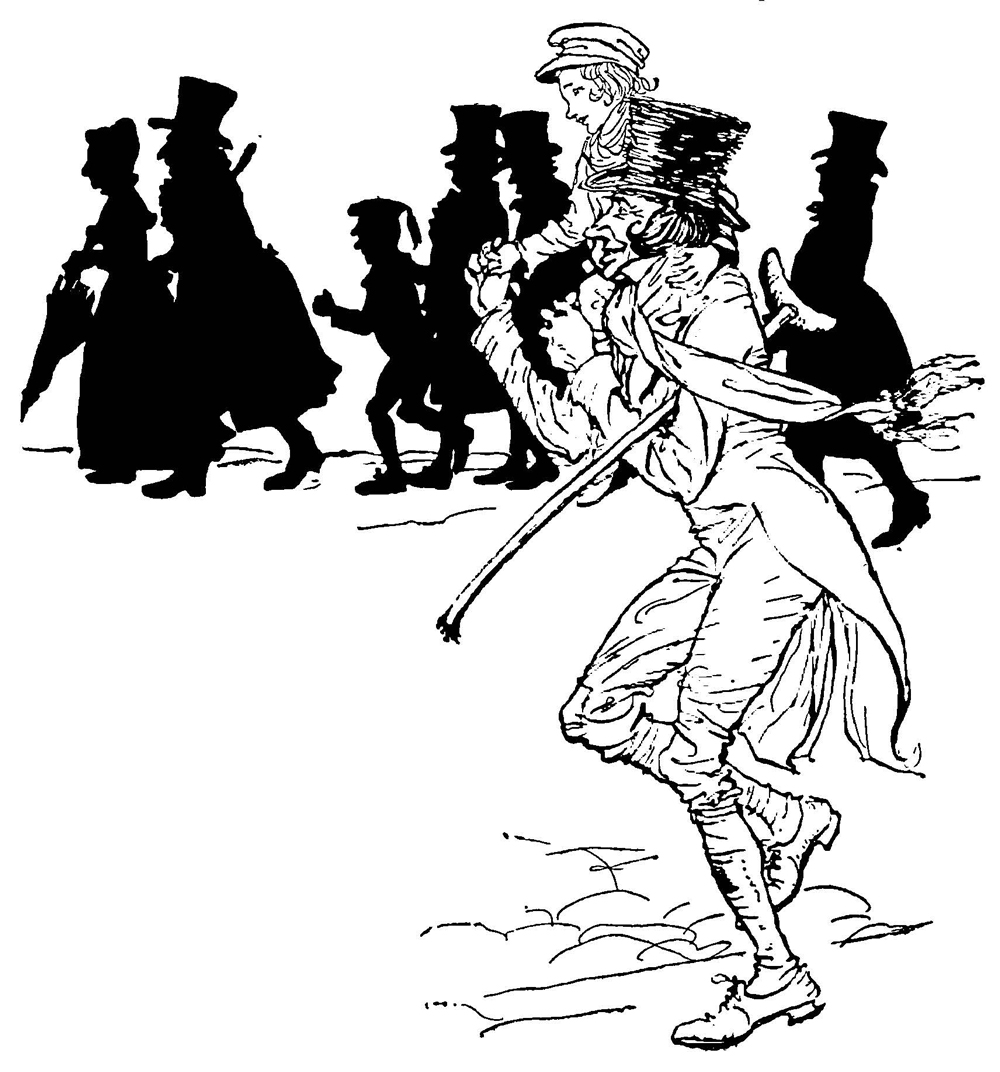
Trembling with fear and with anxiety, the old man awaited in an open place the last of the Spirits—the Ghost of Christmas Yet-to-Come. He had learned much from the two former phantoms; his heart had begun to beat again, and he had begun to see more clearly what life might be in the future, not only to him but to those about him, but he dreaded, not without reason, that it was too late to change his fate, and that what he had willed in the past must now inevitably happen.
“Ghost of the Future!” Scrooge exclaimed, “I fear you more than any specter I have seen. But, as I know your purpose is to do me good, I am prepared to bear you company, and do it with a thankful heart. Will you not speak to me?”
The Spirit, shrouded in a deep black garment which concealed its face and form, made no reply but pointed onward, and Scrooge followed in the shadow of its dress, which seemed to bear him up.
They passed along the streets of London, and here and there heard men discussing the death of some old curmudgeon of a merchant for whom nobody seemed to care and to whose funeral nobody seemed willing to go. They looked into Scrooge’s office, but a stranger sat in his accustomed corner. They saw in a dusty rag-shop a group of women who were selling some dead man’s clothing and the furniture of his rooms; and all these things chilled Scrooge’s blood and filled him with dread as to what he might see at his journey’s end.
At last they entered poor Bob Cratchit’s house and found the mother and children seated round the fire—but quiet, very quiet. The mother was sewing on some black material, but she laid her work upon the table suddenly and put her hand up to her face, saying the color hurt her eyes. “Is it not time for your father, children?” she asked.
“Past it, rather,” Peter answered; “but I think he’s walked a little slower than he used, these last few evenings, mother.”
“I have known him to walk,” said mother, “very fast—with Tim upon his shoulder—very fast indeed. But Tim was very light to carry, and his father loved him so that it was no trouble—never any trouble.”
When Bob came in, Scrooge saw at once what had happened, and saw it with an aching heart. No Tiny Tim was there to meet Bob, and as soon as he had sat down the two middle-sized Cratchits got upon his knees and laid each child a little cheek against his face, as if they said, “Don’t mind it, father; don’t be grieved!”
The tears were so thick in Scrooge’s eyes that he could hardly see, and his sobs shook him so that he followed the Spirit with difficulty as he sped away from that grief-stricken house, away, away to a lonely graveyard where, upon a neglected stone the carved letters EBENEZER SCROOGE were plainly to be seen.
Scrooge fell upon his knees before the Phantom at this sight, and begged that the name might be erased from the stone. “I am not the man I was!” he cried. “Assure me that I yet may change these shadows you have shown me by an altered life. I will honor Christmas in my heart, and try to keep it all the year. Have pity upon me, Spirit, that these things may not befall!”
He still knelt, holding up his hands in eager supplication, when he seemed to see an alteration in the Phantom’s hood and dress. . . . It shrank, collapsed, and, wonder of wonders, it dwindled down to his own bed-post!
. . . . . . . . . . .
Yes, it really was his own bed-post. “The bed was his own, the room was his own, and, best and happiest of all, the time before him was his own, to make amends in. He scrambled out of bed, so happy that he could hardly stand. He rushed to the window, and there were the churches ringing out the lustiest peals he had ever heard: “Clash, clang, hammer, ding, dong, bell. Bell, dong, ding, hammer, clang, clash. Oh, glorious, glorious!”
“What day is this?” cried Scrooge to a boy in the street below.
“What!” returned the boy, with all his might of wonder. “Why, CHRISTMAS DAY!”
“Christmas Day!” thought Scrooge. “Then the Spirits must have done it all in one night. Why, it’s wonderful! I can begin all over again!”
And he did begin all over again, and he did it immediately. He asked the boy in the street that very minute to go and buy the prize turkey at the corner and take it to the Cratchits’; he met in the square, when he went out, the very gentlemen who had asked him for help for the poor the previous day, and gave them such a sum that they nearly fainted where they stood; he went to his nephew’s to dinner, and was the life of the party and next morning he was waiting in the counting-house when Bob Cratchit came, and raised his salary before the astonished fellow could wink.
Oh, no, indeed, Tiny Tim did not die; and by and by Scrooge was a second father to him and a help to all the family.
In fact, “Scrooge became as good a friend, as good a master, and as good a man as the good old city of London ever knew.” It was always said of him, thereafter, that he knew how to keep Christmas well, if any man alive possessed the knowledge.
“May that be truly said of us, and all of us! And so, as Tiny Tim observed, God Bless Us, Every One!”
* * * * *
This story was taken from the book:
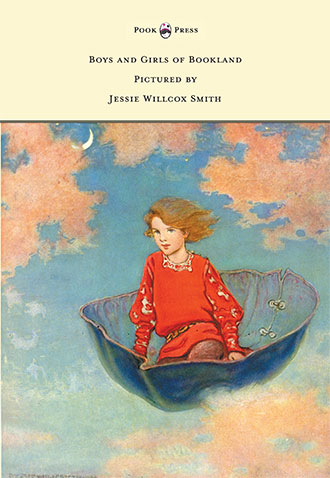
Boys and Girls of Bookland – Pictured by Jessie Willcox Smith
This charming children’s book contains eleven stories of famous child characters in fiction adapted by Nora Archibald Smith. The stories included are David Copperfield, Little Women, Jackanapes, Hans Brinker, Alice in Wonderland, The Little Lame Prince, Heidi – The Alpine Rose, Mowgli, Little Nell and Rebecca of Sunnybrook Farm. This book was originally published in 1923 and contains eleven full-colour plates by Jessie Willcox Smith.

